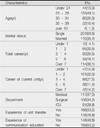Abstract
Purpose
This study was done to explore the relationship in hospital nurses' of communication competence, communication types, and organizational commitment and to provide basic data for developing programs to improve internal communication and to promote nurses' commitment to their organizations.
Methods
The participants included 316 nurses who worked in two general hospitals. The tools used for this study were the Global Interpersonal Communication Competence Scale (GICC) and Communication Satisfaction Questionnaire by Downs & Hazen (1981), revised by Seo (2002) and Mowday's tool (1979) for organizational commitment. Data were analyzed using SPSS/PC+12.0.
Results
The mean score for communication competence was 3.46, and for organizational commitment, 3.19. For communication types, the mean score for formal communication was 3.18 and informal communication, 2.59. Communication competence had a positive relationship with formal communication (r=.32) and with informal communication (r=.16). Organizational commitment had a positive relationship with formal communication (r=.53), communication competence (r=.30), and informal communication (r=.27).
Figures and Tables
Table 2
Score of communication competence, communication types, and organizational commitment (N=316)

References
1. Choi SY. A study of clinical nurse's ego state, assertive communication and perception of communication barrier. 2002. Chonan: Dankook University;Unpublished master's thesis.
2. Mathis RL, Jackson JH. Human resource management. 2010. Cincinnati: South-Western College Publication.
3. Downs CW, Hazen MD, Quiggins J. An empirical and theoretical investigation of communication satisfaction. Paper presented at the annual meeting of the speech communication Association. 1973. New York. U.S.A:
4. Han JL, Hur GJ. The influence of family members' communication competence, locus of control, impulsivity, and optimism on their family relationship satisfaction. Korean J Commun Info. 2005. 28:251–282.
5. Hur GH. A study on development and validity about general interpersonal communication competence. J Korea Commun. 2003. 47(6):380–408.
6. Hyun MY, Lee JE, Kim HH. The communication training needs of nurses in the university hospital. J Korean Acad Psychiatr Ment Health Nurs. 2002. 11(4):443–451.
7. Jang WS. An analysis on organizational commitment in accordance with communication types of hospital organization. 2004. Pusan: Kosin University;Unpublished master's thesis.
8. Jang HS. The effects of interactants perceived conflict management strategies and communication competence on relational outcomes. 2003. Seoul: Kyung Hee University;Unpublished doctoral dissertation.
9. Jeon YM. A correlation study of power, communication and organizational effectiveness in hospital nursing. 1996. Seoul: Hanyang University;Unpublished master's thesis.
10. Jeong SJ. The relationship of communication types, interpersonal relations and depression for nurses in hospital setting. 2007. Gwanju: Chonnam University;Unpublished master's thesis.
11. Kim GJ. A study on turnover process model. 1986. Seoul: Korea University;Unpublished master's thesis.
12. Kim SK. Organization and human behavior. 2005. Seoul: MunKyungsa.
13. Kim SI, Cha SK, Lim JY. A correlational study among internal marketing factor, nurse's job satisfaction, and organizational commitment in hospital nursing organization. J Korea Community Health Nurs Acad Soc. 2001. 15(1):42–55.
14. Kim IS, Lee MH, Ha NS, Jang KS, Hong YM, Lee TH, Kang SJ. Modern nursing management. 2003. Seoul: Hyunmoonsa.
15. Kim JY. A study of types of communication and job satisfaction - nurse, medical person, administration/office person -. 2001. Seoul: Joon Ang University;Unpublished master's thesis.
16. Kong . Communication abilities & organizational conflict of hospital employees. 2005. Seoul: Yonsei University;Unpublished master's thesis.
17. Lee MK. The influence of the organizational communication on the organizational commitment of hospital employee. 2005. Seoul: Yonsei University;Unpublished master's thesis.
18. Lee MH. A relationship between organizational character and organizational commitment on hospital nursing. 2000. Seoul: Kyung Hee University;Unpublished master's thesis.
19. Lee JH, Cho HM, Jang MH. The impact of sports center workers' reliability and communication with their bosses and organizations on their job satisfaction. J Korea Sport Res. 2005. 16(5):927–936.
20. Mowday RT, Steers RM, Porter LW. The management of organization commitment. J Vocat Behav. 1979. 14(2):224–247.
21. Park SS. A study of effects communication on job satisfaction. 1999. Masan: Kyungnam University;Unpublished master's thesis.
22. Park JW. A study on organizational commitment and burnout on nurses. 2002. Seoul: Kyung Hee University;Unpublished master's thesis.
23. Papa MJ. Communicator competence and employee performance with new technology: A case study. Southern Commun J. 1989. 55(1):87–101.

24. Rubin RB, Graham EE, Mignerey JT. A longitudinal study of college students' communication competence. Commun Educ. 1990. 39(1):1–14.

25. Seo IA. A relationship among types of communication, job satisfaction and job performance. 2003. Daegu: Gyemung University;Unpublished master's thesis.
26. Soon JH. A study of effects communication competence on job satisfaction and organizational commitment. 2005. Daegu: Yonnam University;Unpublished master's thesis.
27. Spitzberg BH, Cupach WR. Handbook of interpersonal competence research. 1989. New York: Springer-Verlag.
28. Yeon JI. The relationships of employees' interpersonal communication competence with their communication satisfaction, job satisfaction, and organizational commitment in organizations. 2005. Seoul: Kyung Hee University;Unpublished master's thesis.




 PDF
PDF ePub
ePub Citation
Citation Print
Print







 XML Download
XML Download